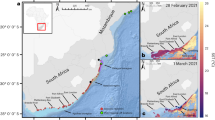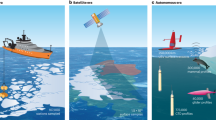Abstract
Strandings of the giant squid, Architeuthis monachus (Steen-strup), have always stirred attention because of the rarity and enormous size of these cephalopods. These animals have never been observed in their natural habitat and little is known about their physiology and ecology. Stranding of giant squids in Newfoundland waters has been correlated with the inflow of warm water, suggesting that increased temperature may be causing their death1. Squids have also been carried to the Norwegian coast with the warm North Atlantic current2 and on 23 August 1982 a live specimen was caught off Radöy near Bergen, Norway (Fig. 1). This catch gave an unprecedented opportunity to study the effects of temperature on the oxygen binding properties of blood from the giant squid. The present finding of an excess of a fourfold decrease in O2 affinity when temperature is increased from 6.4 to 15°C strongly suggests that giant squids may suffocate from arterial desaturation when increased ambient temperatures are experierced.
This is a preview of subscription content, access via your institution
Access options
Subscribe to this journal
Receive 51 print issues and online access
$199.00 per year
only $3.90 per issue
Buy this article
- Purchase on Springer Link
- Instant access to full article PDF
Prices may be subject to local taxes which are calculated during checkout
Similar content being viewed by others
References
Aldrich, F. A. Sarsia 34, 393–398 (1968).
Kjennerud, J. Naturvit. rekke, Univ. Bergen 9, 2–14 (1958).
Gielens, C., Preux, G. & Lontie, R. Eur. J. Biochem. 60, 271–280 (1975).
Lykkeboe, G. & Johansen, K. J. comp. Physiol. 104, 1–11 (1975).
Grigg, G. C. Comp. Biochem. Physiol. 23, 139–148 (1967).
Everaarts, J. M. Netherl. J. Sea Res. 12, 1–57 (1978).
Johansen, K., Brix, O. & Lykkeboe, G. J. exp. Biol. 99, 331–338 (1982).
Lykkeboe, G., Brix, O. & Johansen, K. Nature 287, 330–331 (1980).
Brix, O., Lykkeboe, G. & Johansen, K. Resp. Physiol. 44, 177–186 (1981).
Lykkeboe, G. & Johansen, K. Pacif. Sci. 33(3), 305–313 (1983).
Roper, C. F. E. & Boss, K. J. Scient. Am. 246, 82–89 (1982).
Author information
Authors and Affiliations
Rights and permissions
About this article
Cite this article
Brix, O. Giant squids may die when exposed to warm water currents. Nature 303, 422–423 (1983). https://doi.org/10.1038/303422a0
Received:
Accepted:
Issue Date:
DOI: https://doi.org/10.1038/303422a0
This article is cited by
-
Climate change-related changes in cephalopod biodiversity on the North East Atlantic Shelf
Biodiversity and Conservation (2022)
-
Blue blood on ice: modulated blood oxygen transport facilitates cold compensation and eurythermy in an Antarctic octopod
Frontiers in Zoology (2015)
-
Biochemical composition of cephalopods with different life strategies, with special reference to a giant squid, Architeuthis sp.
Marine Biology (2005)
Comments
By submitting a comment you agree to abide by our Terms and Community Guidelines. If you find something abusive or that does not comply with our terms or guidelines please flag it as inappropriate.



